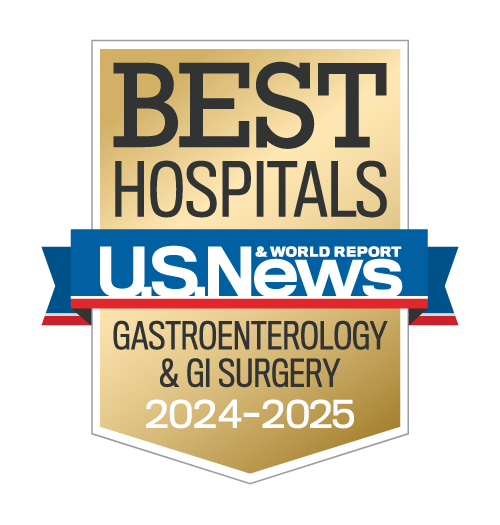Acid reflux—also known as gastroesophageal reflux disease (GERD)—can affect even the simplest activities in daily life. Disruptions to eating, sleeping, and exercise are just some of the ways recurring acid reflux makes itself known. Often, this is experienced as frequent heartburn. More importantly, continued damage to the esophagus from acid reflux can lead to bleeding, scarring, ulcers, and even cancer.
If you experience frequent heartburn, contact the doctors at our Heartburn & Acid Reflux Institute to learn the steps to take to get relief.
What are the risk factors of acid reflux?
The process of digestion begins in the mouth with saliva. Food is broken down and then carried to the stomach through the esophagus. The stomach and esophagus are connected by the lower esophageal sphincter (LES), which opens and closes to allow food to pass into the stomach and keeps that food and stomach acid down. Acid reflux occurs when the LES is weakened and can no longer adequately control the separation of the stomach and esophagus, allowing stomach acid to enter the esophagus and causing discomfort.
- Being overweight or obese: Extra weight can put pressure on the stomach and increase the likelihood of acid reflux.
- Eating large meals or lying down after eating: Both of these behaviors can increase the amount of pressure on the stomach, making it easier for acid to flow back into the esophagus.
- Eating certain foods: Spicy, fatty, or acidic foods can irritate the lining of the esophagus and increase the likelihood of acid reflux.
- Drinking alcohol or caffeine: Both alcohol and caffeine can relax the lower esophageal sphincter (LES), the muscle that keeps stomach acid from flowing back into the esophagus.
- Smoking: Smoking can also relax the LES, making it easier for acid to flow back into the esophagus.
- Pregnancy: Hormonal changes and increased pressure on the stomach during pregnancy can increase the likelihood of acid reflux.
- Certain medical conditions: Hiatal hernia, scleroderma, and other medical conditions can increase the likelihood of acid reflux.
- Medications: Some medications, such as aspirin, ibuprofen, and certain muscle relaxers, can increase the likelihood of acid reflux.
What are the symptoms of acid reflux?
Most frequently, acid reflux is felt as persistent heartburn. This burning feeling in the chest usually begins after eating and can last anywhere from a few minutes to a few hours. The involuntary return of incompletely digested food into the mouth, called regurgitation, is another common complaint.
Other symptoms of acid reflux include:
- A feeling of food sticking in the throat or mouth
- Painful or difficult swallowing
- An acidic taste in the back of the throat
- A sore throat, hoarseness, or a chronic cough
- Persistent belching
- Bad breath
- Excessive mouthwatering
- Inflammation of gums
- Asthma
- The erosion of tooth enamel
If these symptoms sound familiar, visit your primary care provider to see if you are experiencing acid reflux.
How do you diagnose acid reflux?
- Medical history: Your provider will ask you about your symptoms, such as heartburn, regurgitation, and difficulty swallowing, as well as your medical history.
- Physical examination: The physician may perform a physical examination to check for any signs of GERD, such as inflammation or irritation of the esophagus.
- Endoscopy: An endoscopy is a procedure that involves the use of a thin, flexible tube with a camera on the end to look inside the esophagus and stomach. This can help to identify any signs of inflammation, ulcers, or other abnormalities.
- pH monitoring: A pH monitoring test can measure the amount of acid in the esophagus over a 24-hour period. This test can help to diagnose GERD and determine the severity of the condition.
- Esophageal manometry: This test measures the strength and coordination of the muscles in the esophagus, which can help to identify any problems with the movement of food and acid.
- Barium swallow: A barium swallow involves drinking a liquid containing barium, which shows up on X-rays. This can help to identify any abnormalities in the esophagus or stomach.
How do you treat acid reflux?
- Lifestyle changes: Making certain lifestyle changes can help to reduce the symptoms of acid reflux. These may include:
- Eating smaller, more frequent meals
- Avoiding trigger foods, such as spicy or fatty foods, caffeine, and alcohol
- Losing weight if you are overweight or obese
- Elevating the head of your bed
- Quitting smoking
- Medications: There are several medications that can be used to treat acid reflux, including:
- Antacids: These can help to neutralize stomach acid and provide relief from symptoms.
- H2 blockers: These medications reduce the production of stomach acid.
- Proton pump inhibitors (PPIs): These medications block acid production in the stomach and are often used for more severe cases of acid reflux.
- Surgery: Different surgical procedures may be necessary to treat acid reflux, like the LINX System. This may be an option if medication and lifestyle changes are not effective or if there are complications, such as Barrett's esophagus.
Our experienced, board-certified gastroenterologists serve patients throughout the Greater Houston area. No matter where you live or which location you choose, you can trust that we will provide the same patient-centered standards of quality care to everyone.



